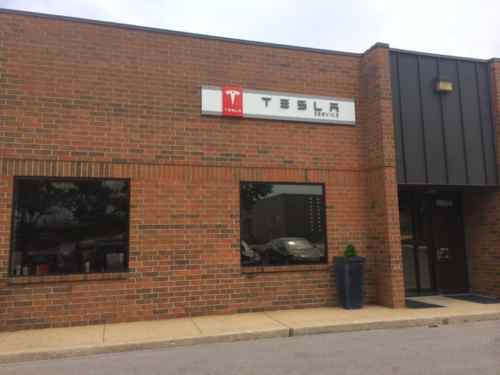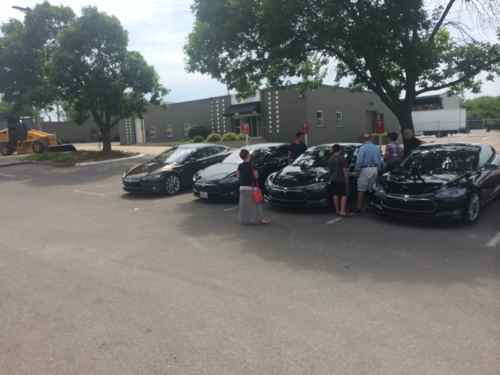Readers: Auto Manufacturers Should Be Able To Sell Direct To Customers
The franchised auto dealership sales model has been around for decades, and a legal requirement to sell cars in the U.S. According to the National Automobile Dealers Association the number of dealerships peaked in 1949 at 49,200, but by 2012 that number was down to 17,540.
The motor vehicle industry began with hundreds of manufacturers, but by the end of the 1920s it was dominated by three large companies: General Motors, Ford, and Chrysler. (Wikipedia)
Quite a drop in the number of manufacturers and dealers!

Here’s more background from a U.S. Department of Justice paper entitled Economic Effects of State Bans on Direct Manufacturer Sales to Car Buyers, May 2009:
Early in the evolution of the auto industry direct manufacturer sales to consumers were not uncommon. At that time, production processes had not yet been standardized and industry sales volumes were low. Introduction by Ford of the assembly line technique early in the twentieth century enabled high-volume production and ushered in the era of mass-market sales in the United States. Ever since then manufacturers have sold cars through franchised dealerships.
Selling through dealerships has offered several benefits to manufacturers historically. Auto production is a capital-intensive business and a franchise system allowed manufacturers to concentrate their resources upstream while accessing capital through franchise fees from independent entrepreneurs at the retail level. Economies of scale in auto production also required having relatively few, large manufacturing operations located near essential supplies like steel. This contrasted with the nationwide distribution network needed to reach consumers, who could be more effectively served through local dealerships in a better position to assess demand in particular markets and to provide service and repairs.
Since running a dealership can require making a substantial investment in real estate and assets like showrooms and service facilities, the franchise system also had to offer terms that would make it attractive to dealers. This was accomplished voluntarily by contract, through franchise agreements, even prior to enactment of state franchise laws. Typically such franchise agreements give a dealer exclusive rights to a particular geographic sales territory of a manufacturer. This type of arrangement allows dealers to realize a return on their investment while giving them incentives to undertake advertising and promotional activities and to provide services, like showroom displays, test drives and other types of consumer information, valuable to manufacturers in marketing their vehicles.
With the advent of the internet, some of the mutually beneficial nature of the franchise system for manufacturers and dealers has diminished, as information and access to services historically provided primarily by dealers has become more readily available. Online buying services are an obvious example. In addition, a variety of auto information, including pricing data and reviews, can be found online from sites like Edmunds and Consumer Reports. This raises the prospect of disintermediation, broadly defined as direct-to-consumer sales through reduction or elimination of the role of retailers. With respect to autos, unlike the situation with books and CDs, most customers probably will continue to want some hands-on contact with the product before purchasing, likely implying a continuing, though possibly changed, role for dealers. Since the internet can potentially provide manufacturers with better information on consumer preferences than the traditional local franchised dealer, direct manufacturer sales may be one way through which that changed dynamic occurs.
When the DOJ recognized how the internet changed the car buying process electric car maker Tesla Motors had only been selling the Roadster for a year, and had introduced the new Model S sedan just two months before. The odds were stacked against Tesla Motors before 2009, one auto site even had a Tesla Death Watch. In 2009 fortunes turned around:
Tesla Motors turned profitable for the first time in July, when the electric car manufacturer shipped a record 109 vehicles, the company said Friday. <snip> In June, privately owned Tesla borrowed $465 million from the Department of Energy to fund development of an all-electric sedan called the Model S — slated to sell for $49,900, or about half the price of the Roadster. (CNN/Money)
Wow, a “record 109 vehicles”!! But the Model S was a hit, from August 2013:
Upstart automaker Tesla Motors won’t sell as many cars this year as Chevrolet sells in 3 days, but its early success with the all-electric Model S sedan is already keeping the competition up at night. An examination of sales data from across the U.S. and in California for the first half of 2013 paints a picture of just why that is. While Tesla delivered right around 10,000 cars through two quarters, those sales appear to be coming at the expense of BMW, Mercedes, Lexus and Porsche. And Tesla’s sales are remarkably — though perhaps not surprisingly — concentrated in California thus far, with nearly half winding up in the Golden State. As the automaker continues to open new sales and service locations across the country while simultaneously growing its network of high-speed Supercharger stations, things are likely to get a bit worse for the imports. (Forbes)
The manufactures responded with new models, the franchised dealers responded with challenges to Tesla’s direct sales model. From October 2012:
Dealers across the country, perhaps afraid money-losing Tesla is somehow a threat, are trying to get the company’s stores knocked down as illegally operating outside the cartel-like, protectionist franchise system they helped put in place.
They may have a point, Tesla’s stores could be illegal factory operations under many state laws, but these are stupid laws and Tesla isn’t wrong for trying to get around them.
This is an issue that comes up occasionally, most recently when Chrysler was forced by its own dealers to sell a factory-owned store in Los Angeles. The argument dealers make (after years of political donations got them cushy deals) is that stores owned by the company that builds the car provides unfair competition. (Jalopnik)
But dealerships want to protect their industry, which depends on very high volumes:
For the third year in a row, net profit in the new-vehicle department remained positive in 2013. During 2006-2010, net profit in the new- vehicle department was negative each year. But while net profit in the new-vehicle department was positive in 2013, the profit per-new-vehicle retailed fell to $69 from $111 the previous year. (NADA)
The dealership industry already knows that all auto manufacturer websites now include a “build your own (model)” feature where customers can pick out the model, colors, options, etc and see the price online. In this regard Tesla Motors is no different than all the big manufacturers, except they don’t have inventory sitting around on dealer lots to sell. Dealers also aren’t a fan of electrics, to sell them effectively they’d need to bash the gasoline vehicles that keeps their lights on.
The push towards EVs is being driven largely by the Obama Administration, which is requiring automakers to double their aggregate fuel economy by 2025. Putting EVs in the mix is one way to skew the average. Car buyers also get a federal credit of $7,500 when they purchase an EV.
Even if dealers agree in principle with EVs, they aren’t great for the bottom line. “Dealers want to move metal, plain and simple,” Kiley says. “There is more education and selling required for EVs than gasoline cars. As long as gasoline remains under $4 a gallon in most of the country, sales of EVs and plug-ins like the Chevy Volt and Ford C-max Energi are going to have steep hills to climb — because the infrastructure to support them is still lagging.” (Mashable)
If manufacturers had a direct sales model they could offer low & high volume models, though they’d prefer to sell higher profit models. Last weekend we visited the model Tesla Motors store and service center to check out the process, even though the used 2007 Honda we recently bought is the limit our budget. I wanted a better understanding, there I saw several serious buyers. One was sitting at an Apple iMac working on their order, others were outside.

The Tesla Motors website indicates a Model S ordered now is estimated for delivery in late September.
When I posted this poll last week I knew, based on my research, that most would favor allowing manufactures to sell direct. I just didn’t know bow much, but the poll here is non-scientific:
Q: How should auto manufacturers sell new vehicles?
- All auto manufacturers should be able to sell directly to customers without going through franchised dealers 55 [70.51%]
- Low volume auto manufacturers should be able to sell directly to customers without going through franchised dealers 12 [15.38%]
- Unsure/no opinion 7 [8.97%]
- All auto manufacturers should be required to go through franchised dealers to sell vehicles to customers 4 [5.13%]
Wow, just over 5% think all manufacturers should be required to use the franchised dealer sales model. The attempt by auto dealers to force out Tesla in Missouri is over for this year, but I expect they’ll be back again next year. But the public isn’t on their side, nor is the Federal Trade Commission:
For decades, local laws in many states have required consumers to purchase their cars solely from local, independent auto dealers. Removing these regulatory impediments may be essential to allow consumers access to new ways of shopping that have become available in many other industries.
This very question has been raised across the country, as a still-young car manufacturer, Tesla, pursues a direct-to-consumer sales strategy that does not rely on local, independent dealers.
In this case and others, many state and local regulators have eliminated the direct purchasing option for consumers, by taking steps to protect existing middlemen from new competition. We believe this is bad policy for a number of reasons.
It’ll be interesting to see how this plays out over the coming years. Disclosure: we have stock in General Motors (GM).
— Steve Patterson
car dealers are some of the worst vermin in the workforce; usually no having no job skills other than having no conscious. i can’t wait for the day when this unnecessary profession is eventually eliminated. i want a car, i know what i want, yet i need to go through some no talent that takes a cut. all these people know how to do is screw people over by the famous line, ‘let me go talk to my manager’… then disappear in the back room…. probably look through some smutting magazine and then come back and stick it to you. over and out, sarge
Yes, i agree with the post that selling through dealerships has offered several benefits to the manufacturers because the manufacturers can able to sell more car in a varied manner through out the world and people can able to access variety brand of cars.
http://www.cavneub-williamson.com/